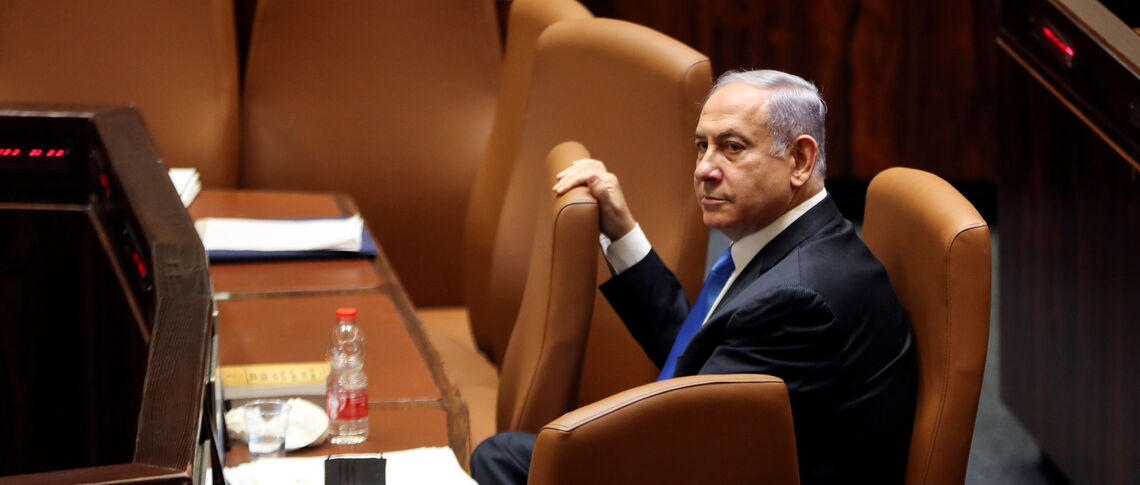For the first time in twelve years Israel’s government will not be led by Benjamin Netanyahu. Since the new Israeli administration headed by Naftali Bennett and Yair Lapid has been sworn in, it is time to take stock of Netanyahu’s twelve-year rule. To understand what made Netanyahu tick and what drove him, it’s crucial to first take a look at Israeli domestic politics.
Over the past year ‘anti-Bibi’ demonstrators have sported stickers or posters featuring the single word ‘Go!’. They were protesting against Netanyahu’s tactic of setting different social segment at one another’s throats: Jews against Arabs, religious against secular, native Israelis against asylum seekers and so on. Bibi, the populist, railed against ‘the elites’. Anyone who stood in his way was dismissed as ‘left-wing’, or quite simply a traitor. No price was too high if it ensured his political survival.
To cling on to power he indulged the excesses of his ultraorthodox allies, giving in to their demands, much to the chagrin of secular Israelis. This behaviour has become particularly blatant over the past year, as the ultraorthodox have flouted the government’s Covid-19 restrictions. Equally blatant has been his approach to the judiciary. As leader of the executive, Netanyahu has consistently sought to discredit it whenever it stood up against human and civil rights violations or unconstitutional infringements by the legislature and the executive.
His personal objective was crystal clear: to wriggle free of the corruption trial against him. The sole reason why Israeli citizens have had to go to the polls four times in the past two years is Netanyahu’s efforts to block the trial. The ensuing erosion of Israeli democracy didn’t appear to bother him.
Annexation and apartheid
Since being sworn in as head of government in 2009, Netanyahu has done his best to accelerate the creeping annexation policy. The number of illegal settlements set up by ‘Hilltop Youth’ zealots has exploded in recent years. What that means for the two-state solution is clear to both Israelis and Palestinians. If the ongoing annexation makes it impossible to found a Palestinian state a system of apartheid is unavoidable. Before the last election, Netanyahu even made sure that the virulently racist Religious Zionism Party, which favours the ‘transfer’ of Palestinians, entered parliament. This ensured a right-wing nationalist majority in the Knesset under Likud leadership.
During the Netanyahu era, the alliance between radical Jewish nationalism and the ultraorthodox has become very close, in contrast to traditional Zionism.
The warning issued as long as 50 years ago that democracy is indivisible and that an undemocratic governance structure in the Occupied Territories would spill over into Israel’s heartland has been borne out in the Netanyahu era. This concerns not only the rights of Palestinians on the West Bank or in East Jerusalem – as the eviction of Arab residents from the Sheikh Jarrah neighbourhood shows – but primarily Israeli Arabs, in other words, Palestinians, who in many respects remain second-class citizens.
Against this backdrop, pogrom-like clashes broke out across Israel between Jews and Arabs during the last weeks of the Netanyahu government. At the latest with the passing of the nation-state law in 2018, the formal basis was established for discrimination against the non-Jewish population. Furthermore, Netanyahu’s making common cause with racists demanding the expulsion of tens of thousands of African asylum seekers showed that, in his view, it isn’t just ‘Arabs’ or Muslims who can be exploited to emphasise the Jewish character of the state.
And that is another legacy of the Netanyahu era: the Palestinian and Israeli conflict is increasingly taking on a religious colouring: Jews against Muslims and vice versa. It was Netanyahu who made Palestinian recognition of Israel as the ‘state of the Jewish nation’ a condition of an agreement. It is all too evident what kind of Jewish-religious ideas underlie this demand.
During the Netanyahu era, the alliance between radical Jewish nationalism and the ultraorthodox has become very close, in contrast to traditional Zionism. The largest settlements on the West Bank are ultraorthodox. As powerful partners in Netanyahu’s governments the religious parties were able to intensify their policy of ‘religionising’ society and buttressing their status as an exclave.
Netanyahu’s foreign policy ‘successes’
The Netanyahu era is also characterised by a number of paradoxes. When in 2020 Netanyahu sought, after the third election, to free himself in a single bound by forming a government in which he – who had always railed against the Arab parties in Israel – sought to win over an Arab party as a partner, he little suspected that this breach of a taboo would release his opponents from an impasse. He did not count on his former political rivals within Likud – Naftali Bennett, Gideon Sa’ar and Avigdor Liebermann, whom he had antagonised and denigrated – forming a coalition against him and toppling him from his pedestal. But other party rivals are now jockeying for position. The struggle to become top dog in Likud is already under way.
When it comes to foreign policy, Bibi’s supporters regard the past 12 years as a success. The Abraham Accords with the United Arab Emirates in September 2020 are not only a breakthrough in relations between Israel and the Arab world. They also appear to show that normalisation of relations no longer needs to depend on making progress in negotiations between Israel and the Palestinians. Netanyahu’s Bar-Ilan speech 2009 on the two-state solution remained a dead letter.
From the standpoint of Israeli nationalism Netanyahu’s open rejection of Obama’s policy and close friendship with then president Donald Trump paid off. The United States recognised Israel’s sovereignty over the Golan Heights and switched its embassy from Tel Aviv to Jerusalem. These two symbolic decisions, welcomed by most Israelis, had hitherto been unimaginable. Trump also shared Netanyahu’s view that the 2015 nuclear deal with Iran is impractical and terminated it. Israel’s readiness to challenge Iran – with the support of Trump and the United States – in turn explains the willingness of some Gulf states that feel threatened by Iran to revise their attitudes towards Israel.
Closing ranks with Trump has ceased to be a guarantee of success in January 2021.
Netanyahu supporters also portray his policy towards Europe as a success. He managed to drive a wedge between EU countries, many of which are highly sceptical of Israel, by cultivating close relations with the Visegrad states and with right-wing conservative parties. This helped to block some anti-Israel resolutions. Besides that, in the Netanyahu era Israel went off the propaganda defensive and onto the offensive. Instead of apologising for scotching the two-state solution Netanyahu branded criticisms of Israel as ‘antisemitism’. The German parliament’s May 2018 resolution condemning the pro-Palestinian ‘Boycott, Divestment, Sanctions’ campaign as the alleged spearhead of antisemitism in Germany marked a high point here. For Bibi fans, applause from outside Europe, from Brazil, India or the Philippines, also counted as a win.
Will Bibi return?
Whether all that can really be regarded as a success is highly questionable, however. The events of May 2021 sent a clear signal. Netanyahu’s hope that the Palestinian question would simply fade away has come to naught. The new fighting in Gaza and the unrest in Israel’s heartland demonstrate emphatically that Netanyahu’s plan has failed.
Closing ranks with Trump has ceased to be a guarantee of success in January 2021. On the contrary, Joe Biden’s win in the United States was not only a defeat for Trump but a bitter disappointment for Netanyahu. The United States is now trying to revive the Iran nuclear deal, and also the peace process between Israelis and Palestinians, which could lead to the two-state solution.
Netanyahu’s one-sided partisanship in favour of the Republicans led to conflict with the Democratic Party and its new president Joe Biden. Netanyahu’s intention of pursuing his own Iran and Palestine policy, against the will of the new US president, indicates not only his delusions of grandeur, but also his absurd willingness to risk confrontation with Israel’s principal ally. And in the post-Trump era proximity to conservative politicians worldwide – such as Orbán, Bolsonaro, Duterte, Modi and Putin – is scarcely a recommendation for the state of Israel.
The one thing holding the new government together is undoubtedly Netanyahu himself. As long as he remains on the scene this hotchpotch of parties can lead the government and try to rehabilitate Israeli democracy. But no one should forget that the majority of voters and MPs are on the right.
A right-wing coalition without Bibi is now possible. But Netanyahu’s return cannot be ruled out either. In fact, comebacks in Israel after a political demise are a regular occurrence. Bibi stepped down as head of government as early as 1999, but was back in office the same year. Declaring the Netanyahu era over and done would be premature. To be on the safe side, any look back on his twelve years in power must be considered a provisional assessment.







